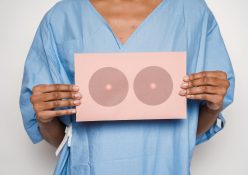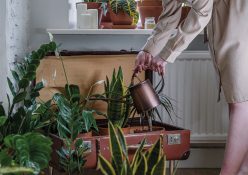Forget what friends tell you, or what you find on social media or through Dr Google – when it comes to your health, trained professionals know best. We asked a selection of them for the number-one piece of advice they give their patients
The Physiotherapist
Sarah Ferguson – Durban-based physiotherapist: ‘Keep active! Movement is better than rest. Our bodies are designed to move and with our modern-day living, driving to work, sitting at a desk, using laptops and cellphones, our bodies aren’t getting enough movement. We start to develop poor habits and weak muscles. Learn to move correctly and do it often. If you have pain or stiffness somewhere, it’s usually your body telling you something’s wrong. Listen to your body – see a professional, sign up for a Pilates class. You don’t have to do something crazy to start moving. Begin by getting up from your desk every 20 minutes and taking a walk.’
The ENT
Dr Mike King – ear, nose and throat specialist, Durban: ‘Respect your ears and your hearing. Never use earbuds in the ear canal, avoid loud music and use earplugs or muffs when performing noisy DIY jobs.’
The Neurologist
Dr Ashleigh Bhanjan – specialist neurologist at the Durban Neuro Laser Clinic: ‘Everything always happens for a reason – sometimes the reasons (for a neurological issue) are not apparent, but time reveals all. Be patient.’
The Oncologist
Dr Justus Apffelstaedt – Apffelstaedt & Associates, a breast, thyroid and parathyroid centre in Cape Town with comprehensive services for cancer-related matters: ‘Once a diagnosis of breast cancer is made, keep a cool head and do nothing for three days at least, to let the diagnosis sink in and you get a clear state of mind again. Remember, breast cancer is a highly curable disease that develops slowly. This gives you time to sort out important decisions. Enquire where there’s a multidisciplinary clinic specialising in breast health. Go there and ask a few questions, such as which specialties are represented in the clinic, how many breast cancers they see a year (more than 150 is a good number, ensuring adequate experience), and whether the members have published scientific articles in the field. These specialists should assess you and come up with a treatment plan and explain it to you as well as the alternatives. The specialists should be able to answer all your questions in an unhurried way. If you are comfortable, stay with this team. If not, go for a second opinion.’
The Gynaecologist
Dr Elize Wethmar – specialist gynaecologist and obstetrician in Benoni: ‘Women are nurturers, and tend to always put everyone before themselves and their own health. As a woman, going for your regular check-up with your gynaecologist is not a luxury, but a necessity. The gynaecological examination is often dreaded, but once you find a gynaecologist you trust and feel comfortable with, it’ll become easier. Nothing that may seem embarrassing to you would be embarrassing to your gynaecologist, and nearly anything that’s been identified early can be either cured or definitely managed.’
The GP
Dr Deseré Ferreira – GP practising in Umhlanga and Pretoria: ‘Follow your gut! Never worry about wasting your doctor’s time. We’re always happy to help or reassure. That feeling in the pit of your stomach can save your or your child’s life – whether it’s a very small lump in your breast, a child complaining about chronic abdominal pain or your teenager’s depressed mood or acne. There are enough things in life to worry about – tick the box and move on!’
The Optometrist
Nina Kriel – optometrist in King William’s Town and guest lecturer at the Universities of Johannesburg and the Free State: ‘Be sure to talk to your optometrist. Ask them about each part of the consultation, particularly the eye-health assessment. It’s fun choosing a stylish frame, and the vision benefits are obvious when you put on the glasses and can see clearly, but we also examine the internal and external health of the eye.’
The Dermatologist
Dr Imraan Jhetam – specialist dermatologist at SkinMedics Dermatology, Skincare & Laser Clinic, Umhlanga and Durban: ‘I recommend two basic skincare routines: sun protection and hydration. These provide the secret to healthy skin and are the best-kept anti-ageing secret out there. Hydration is using an optimal moisturiser for your skin type. Dry skin will need a richer emollient, and oily skin still requires hydration, but in an oil-free moisturiser. These products need to be fragrance-free, with limited additives such as preservatives. Some high-quality moisturisers may include ingredients such as alpha-hydroxy acids for gentle chemical exfoliation. Avoid toners and products that contain mechanical exfoliants. Sun protection should include both chemical and physical protection. Good quality sunblocks will provide an SPF of 50+ and contain extra ingredients such as antioxidants to repair UV damaged skin. Physical sun protection requires a broad-brimmed hat and appropriate clothing outdoors.’
The Dietitian
Julie Deane-Williams – registered dietitian and certified mindfulness facilitator at Minding the Food Space, Cape Town: ‘Having worked for three decades with people struggling with disordered eating, my top advice is about hunger. We all experience physiological emptiness or hunger regularly throughout our day. This reminds us to make a balanced, varied, nourishing choice of food in a bowl or plate, to fuel our bodies well. We also have other hungers: for connection, stimulation, soothing, meaning and space. These hungers often resonate as cravings for certain foods. The cravings are just the symbols of what we truly desire. Once we realise how to feed these different hungers, we begin to live truly authentic, vital lives of purpose.’
The Dentist
Pieter van Rooyen – dentist working in reconstructive and aesthetic dentistry at PatheoDent, Cape Town: ‘My most important message to patients is that dentistry as a profession has evolved into a very high-tech environment, with treatment options varying from a simple oral hygiene procedure to the most incredible CAD or CAM reconstructions of the dentition. But most important of all is that home care is still the basis of all good dental health. Mankind has good or bad genes, but nothing beats a proper brush and floss regime to manage and maintain oral health.’







